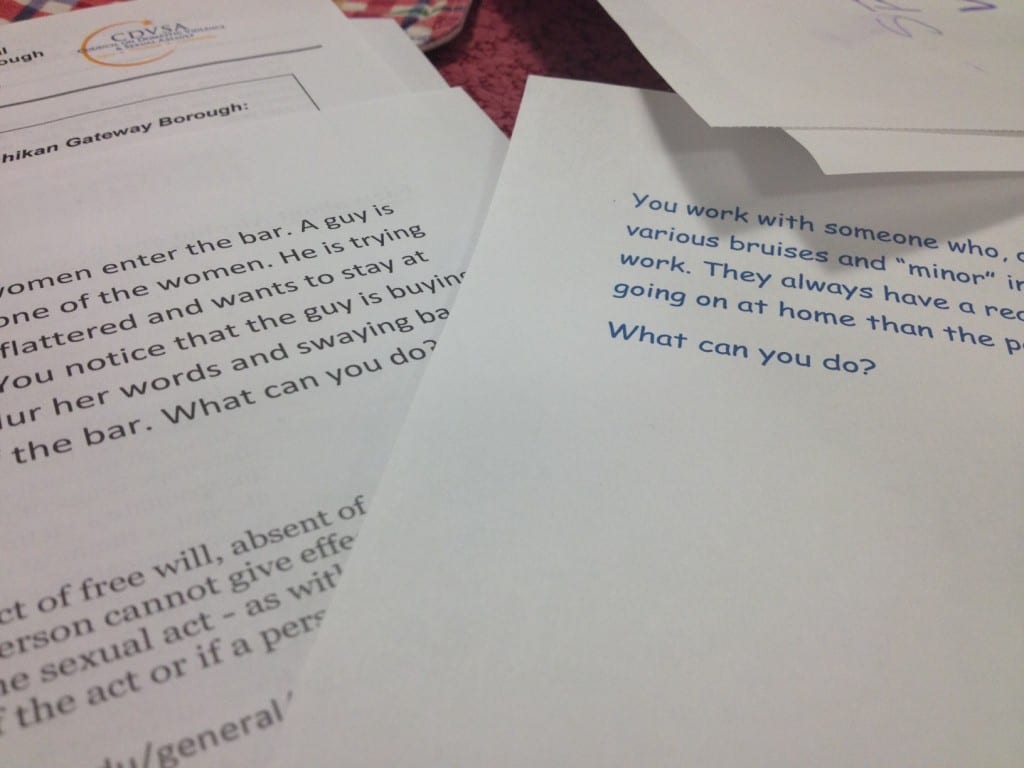A survey last fall put a number on the problem of violence against women in Ketchikan. The Alaska Victimization Survey found that one out of every two women in the borough has experienced sexual violence, domestic violence, or both at least once in their lifetime.
The Ketchikan Wellness Coalition doesn’t want that survey to be forgotten. They set up a community café discussion, inviting the public to talk about what they can do to fight against those odds.
Around 30 people gathered in the Ketchikan High School Library Tuesday night for the What Can You Do discussion.
“We kind of took it off that TV show “What Would You Do,” said LeAnne Waak, from the Promoting Respectful Relationships task force, part of the Wellness Coalition. “You see these situations, and how can you step in safely? Or would you step in?”
Attendees sat at tables and put themselves in the shoes of a witness to a potentially violent or abusive situation. They talked with each other about what they think the best thing to do in each situation would be.
The question at Waak’s table puts you in this situation: You’re at a local bar, and you see a man pushing drinks on a woman and trying to separate her from her friends. Her friends leave, and the man is guiding her out of the bar, when she’s clearly drunk.
“The question is how do you do this without causing another problem?” said John Gabriel. “Which begs the question, can you get the police involved?”
“Before I really started [working with victims of] domestic violence, honestly I would say I would do nothing.” Waak admitted. She said now, if she were in the situation, she would try to get the woman away from the man.
Jeannette Mowers said she would confront the man and ask if he knew the woman. Then, Mowers talked about a violent situation she was in.
“I lived in a situation where I was abused by somebody who didn’t really love me but he told me he loved me for years,” Mowers said. “I found myself turning to drugs and alcohol, and at the times I was on drugs and alcohol, I had something else happen.”
One comment that kept coming up was this: I have daughters. I have children growing up in the community. What can we do to for them to live in a safer Ketchikan?
“I have one daughter of my own, and I’ve been through a lot,” Mowers said. “So I wanted to come here to try to talk about things that would help. One thing I think would help is working with the youth groups with girls to make them stronger.”
After the “What Would You Do” scenarios, the groups talked about a more personal question: What are you going to do here, in this community?
“We have 50 percent of our women and children and sisters and mothers that are being victimized sexually and physically,” said Aftan Lynch. “And one of the reasons is blatant sexism. And so more often than not, we hear comments. People take it for what it is…Standing up and challenging those things, that’s my role in it.”
Becky King, a second grade teacher, said her role is to teach her students things like saying “no” properly.
At the end of the event, everyone went around the room and shared how they plan to try and lower the 50 percent number.
The Wellness Coalition plans to hold more community discussions around what people in Ketchikan can do to help prevent and address domestic violence and sexual assault.







